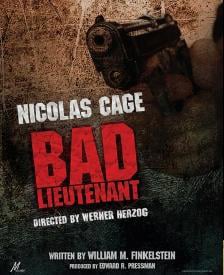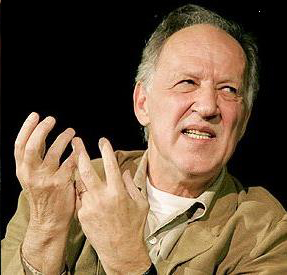
by Manuel Chavarria
I’d all but given up on Werner Herzog as a feature director. Since 1987’s COBRA VERDE, his final collaboration with the great Klaus Kinski, Herzog’s fiction films have become few, far between, and negligible. Not bad, per se. There are moments to love in both 2001’s INVINCIBLE and 2005’s RESCUE DAWN (I’ve yet to see 1993’s SCREAM OF STONE). But neither film really is a world-beater.
Herzog’s documentaries, on the other hand, have gotten stronger with each passing year. ENCOUNTERS AT THE END OF THE WORLD earned Herzog his first Oscar nomination after GRIZZLY MAN returned him to the public consciousness. The documentaries he’s produced over the past couple of decades, including LESSONS OF DARKNESS, GESUALDO, LITTLE DIETER NEEDS TO FLY, and THE WHITE DIAMOND, are among his strongest work.

I am a proud man. I do not like to be wrong. But I am ever willing to admit when I am.
THE BAD LIEUTENANT: PORT OF CALL, NEW ORLEANS is everything I go to the movies to experience. It is undoubtedly one of the most bizarre American films of recent years, and it is an absolute joy to watch. How Herzog and Nicolas Cage have gone this long without working together is both a mystery and a crime. They bring out the best in one another. Cage’s Terence McDonagh is the Bad Lieutenant of the title, and Cage attacks the role with vigor I have not seen from him in years. A lesser actor may have turned McDonagh into a checklist of quirks and drug use. Cage turns McDonagh into a character we care about and route for, despite his less desirable traits.
Herzog turns his documentarian’s eye on Post-Katrina New Orleans and reveals a city shorn of its flashy reputation and left with floods, marshes, and dead reptiles. More than once Herzog foregrounds these reptiles (an alligator in one instance, a pair of iguanas in another) and pushes the standard “policier plot” into the background. What other director would fell compelled to do this?
It’s this maverick spirit that makes the film work. Inevitably, Herzog’s BAD LIEUTENANT will be compared to Ferrara’s, but the films are completely different beasts. Ferrara’s film is of himself – it exists in the same sleaze-ridden New York City that Ferrara himself has for much of his career. Ferrara knows the characters. He may even be one of them. Though the story has been transplanted to New Orleans, a remake could easily have become a forgettable retread, if not for Herzog coming at the material sideways, all but ignoring the plot, and allowing the characters free reign. He looks for the odd detail rather than settling for standard scenarios.
Perhaps what’s most surprising is how funny the movie is. Ferrara’s movie is a tragedy, and a disturbing one. Herzog, given very similar material, plumbs the story for all the humor he can. Sometimes, I suppose, on the road to hell it’s hard not to laugh. Certainly when Nicolas Cage begins talking to drug lord Big Fate about his lucky crack pipe the tragedy of drug abuse is pretty far from the viewer’s mind.
I haven’t said much about the film’s story itself, but there isn’t much to say. THE BAD LIEUTENANT: PORT OF CALL, NEW ORLEANS is not a film about plot. Roger Ebert is spot on when he says that the movie is “about seasoning. Like New Orleans cuisine, it finds that you can put almost anything in the pot if you add the right spices and peppers and simmer it long enough.” It’s not about the chicken, it’s about those herbs and spices. There’s no better way to describe what Herzog’s cooked up here. Come for the performances. Stay for the photography and the singing lizards.